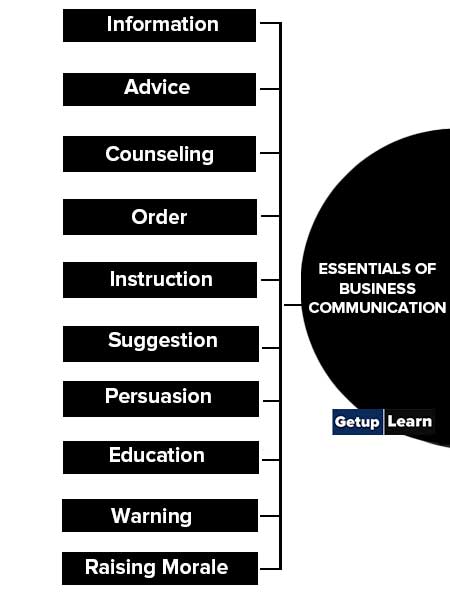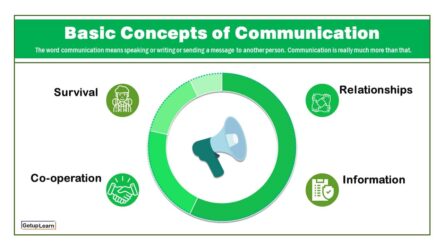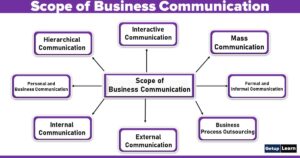Table of Contents
What are the Essentials of Business Communication?
The main purpose of all communication in an organization is the general welfare of the organization. Effective communication is needed at all stages in order to ensure this welfare. At the planning stage, information is needed on the various aspects of the enterprise, the feasibility of the project being undertaken, finances involved, manpower required, marketing conditions, publicity campaigns, etc.
At the execution stage, orders are issued to the employees to start work, the workers associated with the project are constantly motivated and kept involved, a sense of discipline is cultivated among them and their morale is kept high. All this requires constant two-way communication between the managers and the employees.
At the assessment stage, the manager is again required to communicate with various sources, both internal and external, to assess the success of the project, and if a need is felt, to envisage modifications in future plans.
Below that we study about essentials of business communication.
Essentials of Business Communication
These are the essentials of business communication explained below:
- Information
- Advice
- Counseling
- Order
- Instruction
- Suggestion
- Persuasion
- Education
- Warning
- Raising Morale
- Motivation

Information
One of the most important objectives of communication is passing or receiving information about a particular fact or circumstance. Information can be done either through spoken or written language or by using another system of signs or signals. Managers need complete, accurate, and precise information to plan and organize; employees need it to translate planning into reality.
External information
External information on the following aspects is vital for the existence and welfare of any organization:
- Information about its products: (i) consumer response to its products in comparison to competing products with reference to quality as well as price, (ii) whether they are being produced in conformity with the latest trends.
- Information about the availability of credit: the nature of the various financial institutions and the terms and conditions on which credit is offered by them.
- Information about the availability of raw materials: how better quality raw materials can be procured on easier terms, or if cheaper substitutes are available Information about the Government rules and regulations: what kind of effect the rules and regulations of the Government and the changing political scene can have on the product policy of the organization.
- Information about the advertising media: their efficiency, suitability, relative merits and the expenses involved.
- Information about the latest development in the fields of science and technology: how innovations can be used to modernize the production techniques either to improve the quality of the products or to affect the economy in labor, time, money, etc.
Internal Information
Internally, information should be freely given to the employees on the following points:
- Information on job assignments and procedures governing them: Information about the precise nature of every employee’s job, its scope, and the procedures governing it should be readily available to every employee as well as in the files of the organization.
- Information on status and decision-making powers: The exact designation of the officers and the decision-making powers enjoyed by them should be clearly defined.
- General information on the policies and activities of the organization: If the employees are kept well informed about the policies of the organization and other related aspects, it inculcates a sense of belonging and gives them greater job satisfaction. It also helps them to acquire self-confidence.
Advice
Giving advice is another important objective of communication. Information is always factual and objective. But advice, since it involves personal opinions, is likely to be subjective. Information is neutral in itself. When it is offered to a person, he may use it as he likes. But advice is given to him either to influence his opinion or his behavior. It may prove helpful, but it may also lead to disaster.
Importance of Advice
Commercial activities in the modern world have become extremely complex. Each individual activity needs specialized handling, which cannot be expected from people working single-handed. However competent a businessperson may be, he cannot have specialized knowledge of all branches like a fiancé, publicity, taxation, engineering, public relations, etc.
If he wants to run his business successfully, he will have to seek expert advice quite frequently. Within the organization, the supervisory staff is required to advise the junior employees. Supervisors are usually persons of long-standing and have a great deal of experience at their command.
Being in close contact with their superiors (usually the board of directors) they are well familiar with the policies and functioning of the organization. They are, therefore, in an excellent position to guide, counsel, or advise their subordinate staff.
Advice Flows Horizontally or Downwards
Advice by its very nature flows horizontally or downwards. Expert advice from outside flows horizontally. The boards of directors advising one another on some policy matters are also engaged in a kind of horizontal communication. But advice soon starts flowing down to the management personnel, the supervisory staff, and the subordinate staff or the operatives.
How to Make Advice Effective?
While offering advice, the advisor should keep the following points in mind:
- Advice should be both man-oriented and work-oriented, i.e., it should be related to a specific piece of work, and should be given in such a way that it suits the individual needs of the recipient. It means that while explaining the complexities and subtleties of a job, the adviser ought to keep in mind the understanding power of the person he is advising.
- Advice should not be given to a person to make him feel conscious of his inferior knowledge or skill. If the adviser assumes a patronizing tone, the other person may resent it. So the adviser ought to be very friendly in his attitude.
- The only justified motive for giving advice is the betterment of the worker. The adviser should genuinely feel this motive. And he should give this very feeling to the worker. He should so mold his tone and phrase his language so that he makes the other persons feel absolutely at ease.
- If offered in the right tone, advice can often promote better understanding between the adviser and his subordinates. It can prove that the adviser is taking a personal interest in his subordinate staff and is, therefore, interested in their welfare.
- If the subordinate staff is given the freedom to react, advice can become a two-way channel of communication. It may perhaps bring about some excellent suggestions for the improvement of the organization’s functioning.
Counseling
Counseling is very similar to advise. Only, counsel is objective and impersonal. The counselor is a man of greater skill or knowledge on some specific subject and offers his counsel without any personal interest or involvement. Advice has a personal touch about it; counsel is almost professional. Advice is often unsought and is unwelcome; counsel is eagerly sought.
A number of large business houses now have counseling departments, which offer the employees advice on domestic or personal problems. Even an efficient employee may become tardy and indifferent if he is facing some personal problems at home. This may adversely affect the working of the organization. It may also infect other employees and lower their morale.
Such employees are encouraged to consult the counseling department, which has on its staff a panel of doctors, psychologists, and social workers. These experts hold a series of sittings with the employees and thrash out their problems. The employees are restored to their mental and physical health and the conditions in the organization are brought back to normal.
Order
Order is an authoritative communication. It is a directive to somebody, always a subordinate, to do something, to modify or alter the course of something he is already doing, or not to do something. Whatever the nature and size of an organization, orders are absolutely necessary for it. The downward flow of information is dominated by orders.
Types of Order
These are the different types of order, we can classify orders in various ways:
-
Written and Oral Orders: Written orders are usually given in the following cases:
- The order is of a highly responsible nature. It is essential to keep a record of it and to make it absolutely specific.
- The task is repetitive in nature. It is cumbersome and inconvenient to issue oral orders every time the task is to be done.
- The person being ordered is remotely situated and it is not possible to give him oral orders. Oral orders are given in the following cases:
- The job is required to be done immediately.
- It is an ordinary job and there is no need of maintaining any written record.
- There is a kind of permanent superior-subordinate relationship between the giver and the receiver of the order and the order-giver does not feel the need of entering into the cumbersome process of issuing written orders.
- The order is of a highly responsible nature. It is essential to keep a record of it and to make it absolutely specific.
-
General and Specific Order: If orders are related to one particular activity, they are specific. If there are a number of activities having operational similarities, general orders may be issued to cover all of them. Again, in case it is not possible to foresee all the attendant situations connected with an activity, it may become necessary to issue general orders.
-
Procedural and Operational Orders: Procedural orders specify procedures to be adopted. They are general by nature. Operational orders are more closely related to the job at hand. They specify how a particular job is to be done.
- Mandatory and Discretionary Orders: Mandatory orders have to be obeyed. Discretionary orders are usually in the nature of recommendations. They suggest what is desirable, and what should be done. But it is up to the receiver to see their feasibility and to decide whether he ought to carry them out or not. The Head Office may issue discretionary orders to the branch manager, for the branch manager, being present on the spot, knows better whether the orders are to be carried out or not.
Characteristics of an Effective Order
- Order must be clear and complete so that the person who receives the order knows exactly what to do, how to do and when to do it.
- Order execution should be possible, that is, the person who has to execute it has the materials, tools, equipment, time, and ability to execute it. If any hurdles are likely to be experienced, the order should specify how they are to be overcome.
- The order should be given in a friendly way so that it is not resented and is not carried out reluctantly.
Instruction
Instruction is a particular type of order in which the subordinate is not only ordered to do a job but is also given guidance on how to do it. If the accounts officer asks one of his clerks to prepare a voucher, he has issued an order. If he shows the clerk how to prepare a voucher and then asks him to prepare more, he has issued instructions.
Suggestion
It would be wrong to presume that the best ideas on a subject come only from the supervisory staff or the directors. The lower staff, in fact being actually in touch with the operative aspect, is capable of giving some positive suggestions on procedural and operational aspects.
Suggestion enjoys one great advantage over other means of communication like advice or order. The advice comes from an expert; order comes from a higher authority. In either case, the recipient of the communicator is slightly conscious of his inferiority and may resent it.
Accepting a suggestion is at his discretion, so a suggestion is usually welcome. A suggestion is supposed to be a very mild and subtle form of communication. Still, since it flows horizontally or vertically upwards, it may hurt someone’s ego to recognize its utility and readily accept it. But enlightened executives should set aside the ridiculous notions of false self-importance and welcome positive, constructive suggestions with an open mind.
Persuasion
Persuasion may be defined as an effort to influence the attitudes, feelings, or beliefs of others, or to influence actions based on those attitudes, feelings, or beliefs. Persuasion is an important objective of communication. Buyers have often to be persuaded to buy a particular article available with the seller in place of the one they actually wanted to buy.
In the office of the factory, the lazy, the incompetent and the disgruntled workers have to be persuaded to do their work. Human nature is not amenable to coercion or repression. Whenever force is applied to command a particular action, it breeds resentment and indignation.
It is better to use persuasion than compulsion. But even persuasion seeks to change beliefs and attitudes, which people do not like at all. So in order to be successful, persuasion has to be indirect and suggestive. The buyers and the workers should be so manipulated that they change their minds without getting conscious of the change, or if they are conscious, they believe that the change is to their advantage. Persuasion is an art, which has to be learned with great care.
Education
Education is a very conscious process of communication. It involves both teaching and learning and extends over considerably long periods. The main purpose of education is to widen knowledge as well as to improve skills. It is carried on at three levels:
Education for Management
Knowledge is multiplying fast. Each new day brings with it innovations, which if suitably applied can revolutionize the working of an organization. Managers are required to keep themselves abreast of the latest innovations.
In other words, they have to be educated. Their education can take place through books, lectures, seminars, case studies, study tours, etc. Junior managers have to be educated to assume responsibility when they succeed in higher positions.
Education for Employees
Just as the managers are required to learn about innovations in the field of commerce and technology, when these innovations are introduced in the office or the factory, the employees have to be educated to use them. Such a program of education is called reorientation. Employees can be educated through talks, demonstrations, bulletins, and house organs.
Education for Outside Public
The outside needs knowledge of the new products being introduced into the market, the relative merits of the various brands already existing, the availability of the substitutes, complementary and supplementary products, comparative prices, concessions, and discounts if any. This useful knowledge is offered through advertisements, especially sponsored features in the newspapers, information talks, and articles.
Warning
If employees do not abide by the norms of the organization or violate the rules and regulations, it may become necessary to warn them. Tardiness, negligence, defiance, tempering with the records, mishandling equipment, lack of regularity and punctuality, gossiping, pilfering office stationery and material, spreading rumors, and misleading new employees are some of the actions that call for a reprimand or a warning.
The warning is a forceful means of communication, for it demands immediate action. But in order to retain its effectiveness, it should be used sparingly and discreetly.
Raising Morale
Moral stands for mental health. It is the sum of several qualities like courage, fortitude, resolution, and confidence. High morale and efficient performance go hand in hand. It acts as a kind of lubricant among people, binds them with a sense of togetherness, and impels them to work in cooperation with one another in the best interest of their organization.
Factors conducive to the creation of a high morale
- Every worker gets work suited to his physical and intellectual caliber. He feels his work is important and is appreciated by the authorities. He is free to do his work as he likes. He is encouraged to give suggestions.
- The atmosphere on the premises is congenial. The superiors are efficient and their attitude is constructive. They enjoy the worker’s respect.
- Promotional avenues are available to the workers. • Genuine grievances of the workers are promptly removed.
Motivation
Motivation energizes and activates a person and channelizes his behavior towards the attainment of desired goals. Motivation and behavior are intimately related to each other. In the case of order and persuasion, the communicator enjoys an upper hand. But in motivation, he keeps himself in the background. He does not order his employees to work; he motivates them so that they work willingly and eagerly.
A motivated worker does not need much supervision. He does his work as if it were his own as if his own interests were closely tied up with the successful performance and completion of the work entrusted to him.
An office or factory that enjoys the support of motivated workers shows much better results than another office or factory in which workers are commanded to work. Offering monetary incentives is perhaps the most effective form of motivation.
People working on a contract basis are always motivated to work, for their earnings increase in proportion to their work. People work reluctantly during office hours but willingly stay back to work overtime.
What is essential in business communication?
Following are the essentials of business communication:
1. Information
2. Advice
3. Counseling
4. Order
5. Instruction
6. Suggestion
7. Persuasion
8. Education
9. Warning
10. Raising Morale
11. Motivation.


















